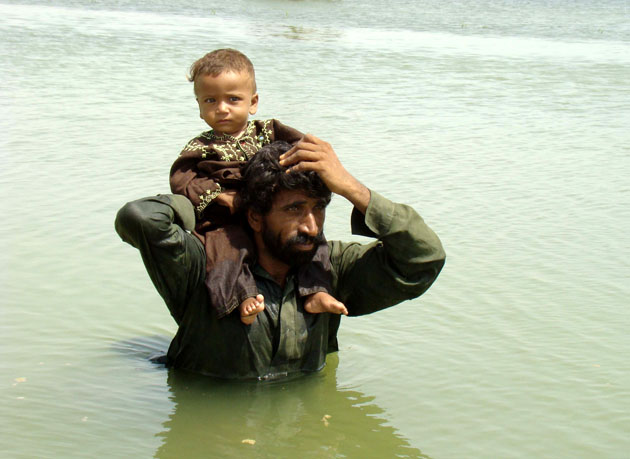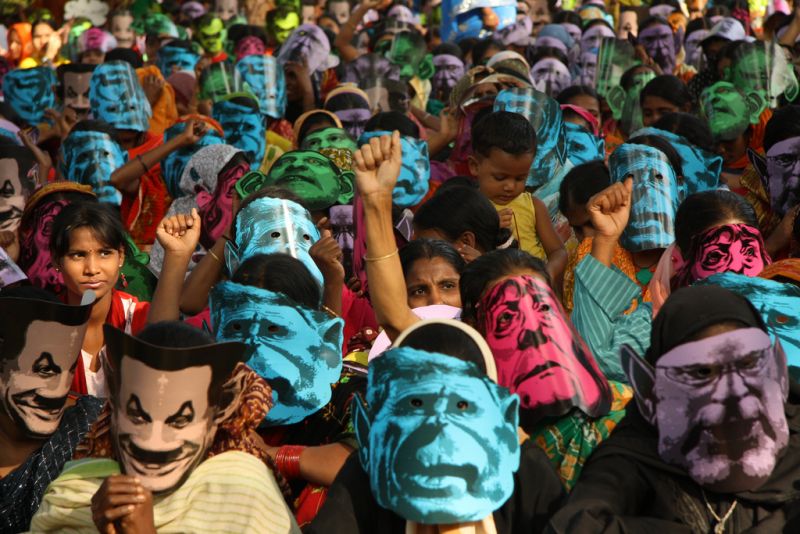
A man crossing flood waters in central Pakistan, September 2012.Xinhua/ZUMA
This story first appeared on the Guardian website and is reproduced here as part of the Climate Desk collaboration.
Children will bear the brunt of the impact of climate change because of their increased risk of health problems, malnutrition and migration, according to a new study published on Monday. And food prices are likely to soar as a result of warming, undoing the progress made in combating world hunger.
The findings are published as scientists began meeting in Stockholm to produce the most comprehensive assessment yet of our knowledge of climate change. Over the next five days, the Intergovernmental Panel on Climate Change, bringing together the world’s leading experts, will thrash out the final details of a message to the world’s governments.
They are expected to warn that climate change is almost certainly caused by human actions, and that it will lead to a global temperature rise likely to top 2 degrees Celsius, with related effects including the shrinking of the Arctic ice cap and glaciers, a rise in sea level by nearly 1 meter by the end of this century and more extreme rainfall in parts of the globe.
Unicef argues that, although children are more vulnerable to the effects of global warming, they have been largely left out of the debate. “We are hurtling towards a future where the gains being made for the world’s children are threatened and their health, wellbeing, livelihoods and survival are compromised…despite being the least responsible for the causes,” said David Bull, Unicef’s UK executive director. “We need to listen to them.”
Children born last year will come of age in 2030, by which time the effects of climate change in the form of an increase in droughts, floods and storms are likely to be more in evidence. In the 10 most vulnerable countries, including Bangladesh, India, and the Philippines, there are 620 million children under 18.
Unicef estimates that 25 million more children will suffer malnourishment because of climate change, with a further 100 million suffering food insecurity, where they and their families are on the verge of running out. Among the 150-200 million people estimated to have to flee their homes because of climate change, children will suffer more than adults because of their relative lack of resources and higher vulnerability to disease. In heat-waves, likely to grow more intense and frequent under climate change, babies and small children are more likely to die or suffer heatstroke because they find it difficult to regulate their body heat.
Separately, a report by Oxfam warned that global warming would cause rapid rises in food prices, causing severe consequences in poor countries. In pointed contrast to climate skeptics, who have seized on some of the areas of uncertainty in the IPCC assessment to claim that global warming is a far-off and minor problem, Oxfam listed recent examples of extreme weather that have caused food shortages and raised prices, quoting scientific estimates that these are likely to increase in number as warming continues. “Today one person in eight goes to bed hungry. Analysis suggests that the number of people at risk of hunger is projected to increase by 10-20 percent by 2050 as a result of climate change,” the study found.
The authors cited the 2012 drought in Russia, which cut the grain harvest by a quarter, resulting in grain and bread prices rocketing and many farmers falling into serious debt and hardship. The same year, the worst drought in 50 years in the Midwest of the US cut maize yields by a quarter, leading to a 40 percent rise in prices. Two years before, the devastating Pakistan floods destroyed 570,000 hectares of crops, and 80 percent of food stored was lost in some areas.
Oxfam also cites a study that suggested the 2011 drought in East Africa and famine in Somalia were made more likely by climate change. One of the problems with estimating the future effects of warming is that natural events such as storms, floods, and droughts happen anyway and it is hard to blame particular occurrences on global warming. On this, the panel is expected to say on Friday that extreme weather effects are more likely because of climate change, but will stop well short of attributing specific events solely to climate change.
Tim Gore from Oxfam said: “We want a world in which everyone enjoys the right to affordable and nutritious food, and we cannot allow climate change to throw us off course. Leaders listening to the latest findings from climate scientists this week must remember that a hot world is a hungry world. They must take urgent action to slash emissions and direct more resources to building a sustainable food system.”












